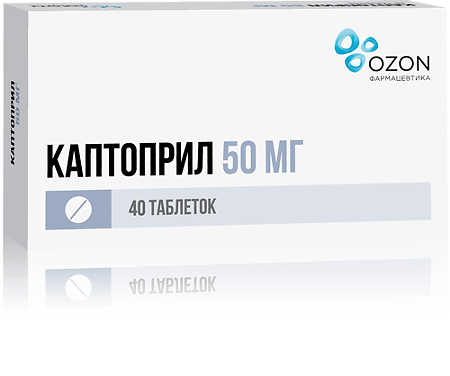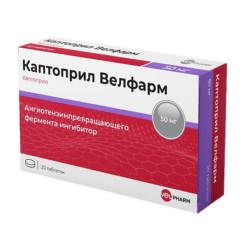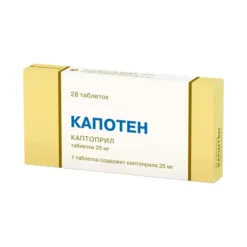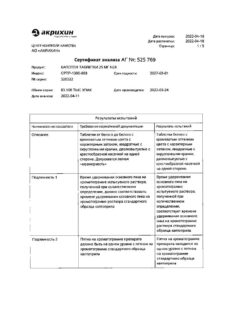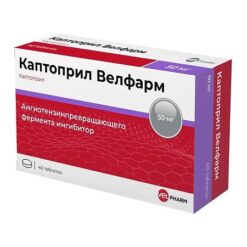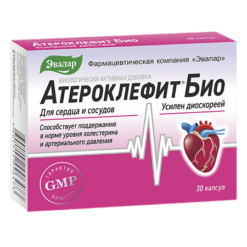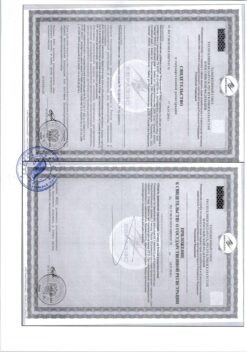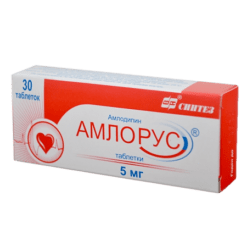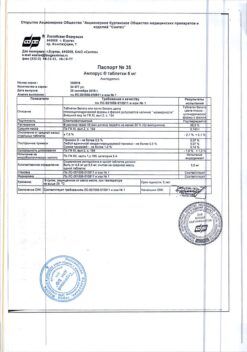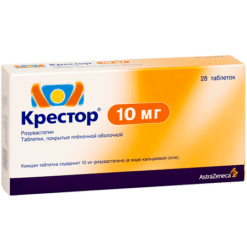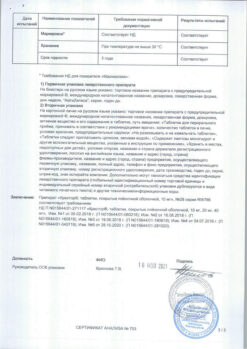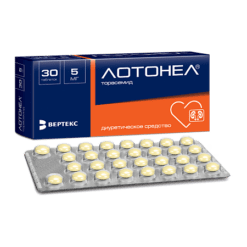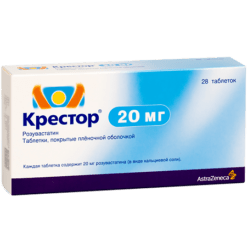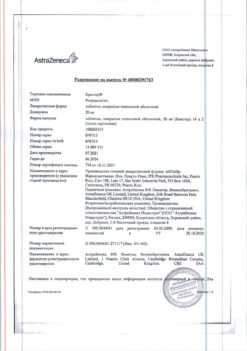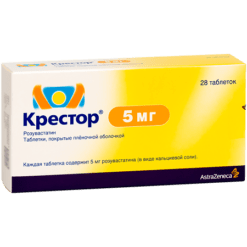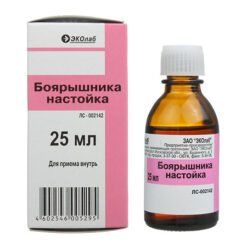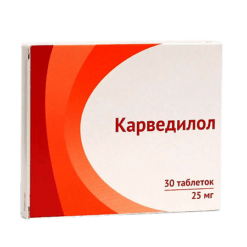No products in the cart.
Captopril, tablets 50 mg 40 pcs.
€3.29 €2.74
Description
An antihypertensive agent, ACE inhibitor. The mechanism of antihypertensive action is associated with competitive inhibition of ACE activity, which leads to a decrease in the rate of conversion of angiotensin I to angiotensin II (which has a marked vasoconstrictor effect and stimulates aldosterone secretion in the adrenal cortex). In addition, captopril appears to affect the kinin-callikrein system by inhibiting the breakdown of bradykinin. Hypotensive effect does not depend on the activity of plasma renin, BP reduction is noted at normal and even reduced concentration of the hormone, which is due to the effect on tissue RAAS. It increases coronary and renal blood flow.
Owing to the vasodilator effect, it decreases ROS (post-load), congestion pressure in the pulmonary capillaries (preload) and resistance in the pulmonary vessels; it increases cardiac minute volume and exercise tolerance. With long-term use, it reduces the severity of left ventricular myocardial hypertrophy, prevents the progression of heart failure and slows the development of left ventricular dilatation. Helps reduce sodium in patients with chronic heart failure. Dilates arteries more than veins. Improves blood supply to ischemic myocardium. Reduces platelet aggregation.
Lowering tone of the renal tubular arterioles, improving intra-column hemodynamics, prevents the development of diabetic nephropathy.
Indications
Indications
Arterial hypertension (including renovascular), chronic heart failure (as part of combination therapy), left ventricular dysfunction after myocardial infarction in patients in a clinically stable condition.
Pharmacological effect
Pharmacological effect
Antihypertensive drug, ACE inhibitor. The mechanism of antihypertensive action is associated with competitive inhibition of ACE activity, which leads to a decrease in the rate of conversion of angiotensin I to angiotensin II (which has a pronounced vasoconstrictor effect and stimulates the secretion of aldosterone in the adrenal cortex). In addition, captopril appears to have an effect on the kinin-kallikrein system, preventing the breakdown of bradykinin. The hypotensive effect does not depend on the activity of plasma renin; a decrease in blood pressure is observed at normal and even reduced concentrations of the hormone, which is due to the effect on the tissue RAAS. Increases coronary and renal blood flow.
Thanks to its vasodilating effect, it reduces roundabout percentage (afterload), wedge pressure in the pulmonary capillaries (preload) and resistance in the pulmonary vessels; increases cardiac output and exercise tolerance. With long-term use, it reduces the severity of left ventricular myocardial hypertrophy, prevents the progression of heart failure and slows down the development of left ventricular dilatation. Helps reduce sodium levels in patients with chronic heart failure. Dilates arteries more than veins. Improves blood supply to ischemic myocardium. Reduces platelet aggregation.
Reduces the tone of the efferent arterioles of the glomeruli of the kidneys, improving intraglomerular hemodynamics, and prevents the development of diabetic nephropathy.
Special instructions
Special instructions
Caution should be used if there is a history of angioedema during therapy with ACE inhibitors, hereditary or idiopathic angioedema, aortic stenosis, cerebrovascular and cardiovascular diseases (including cerebrovascular insufficiency, coronary artery disease, coronary insufficiency), severe autoimmune connective tissue diseases (including SLE, scleroderma), with suppression of bone marrow hematopoiesis, with diabetes mellitus, hyperkalemia, bilateral renal artery stenosis, stenosis of the artery of a single kidney, condition after kidney transplantation, renal and/or liver failure, against a diet with sodium restriction, conditions accompanied by a decrease in BCC (including diarrhea, vomiting), in elderly patients.
Active ingredient
Active ingredient
Captopril
Composition
Composition
1 tab. – captopril 50 mg
Pregnancy
Pregnancy
It should be borne in mind that the use of captopril in the second and third trimesters of pregnancy can cause developmental disorders and fetal death.
Contraindications
Contraindications
Pregnancy, lactation, age under 18 years, hypersensitivity to captopril and other ACE inhibitors.
Side Effects
Side Effects
From the central nervous system and peripheral nervous system: dizziness, headache, feeling of fatigue, asthenia, paresthesia.
From the cardiovascular system: orthostatic hypotension; rarely – tachycardia.
From the digestive system: nausea, loss of appetite, disturbance of taste; rarely – abdominal pain, diarrhea or constipation, increased activity of liver transaminases, hyperbilirubinemia; signs of hepatocellular damage (hepatitis); in some cases – cholestasis; in isolated cases – pancreatitis.
From the hematopoietic system: rarely – neutropenia, anemia, thrombocytopenia; very rarely in patients with autoimmune diseases – agranulocytosis.
Metabolism: hyperkalemia, acidosis.
From the urinary system: proteinuria, impaired renal function (increased concentrations of urea and creatinine in the blood).
From the respiratory system: dry cough.
Allergic reactions: skin rash; rarely – Quincke’s edema, bronchospasm, serum sickness, lymphadenopathy; in some cases – the appearance of antinuclear antibodies in the blood.
Interaction
Interaction
When used simultaneously with immunosuppressants and cytostatics, the risk of developing leukopenia increases.
When used simultaneously with potassium-sparing diuretics (including spironolactone, triamterene, amiloride), potassium preparations, salt substitutes and dietary supplements containing potassium, hyperkalemia may develop (especially in patients with impaired renal function), because ACE inhibitors reduce the content of aldosterone, which leads to potassium retention in the body while limiting the excretion of potassium or its additional intake into the body.
With the simultaneous use of ACE inhibitors and NSAIDs, the risk of developing renal dysfunction increases; hyperkalemia is rarely observed.
When used simultaneously with loop diuretics or thiazide diuretics, severe arterial hypotension is possible, especially after taking the first dose of the diuretic, apparently due to hypovolemia, which leads to a transient increase in the antihypertensive effect of captopril. There is a risk of developing hypokalemia. Increased risk of developing renal dysfunction.
When used simultaneously with anesthetics, severe arterial hypotension is possible.
When used simultaneously with azathioprine, anemia may develop, which is due to inhibition of erythropoietin activity under the influence of ACE inhibitors and azathioprine. Cases of the development of leukopenia have been described, which may be associated with additive suppression of bone marrow function.
When used simultaneously with allopurinol, the risk of developing hematological disorders increases; Cases of severe hypersensitivity reactions, including Stevens-Johnson syndrome, have been described.
With the simultaneous use of aluminum hydroxide, magnesium hydroxide, magnesium carbonate, the bioavailability of captopril decreases.
Acetylsalicylic acid in high doses may reduce the antihypertensive effect of captopril. It has not been conclusively established whether acetylsalicylic acid reduces the therapeutic effectiveness of ACE inhibitors in patients with coronary artery disease and heart failure. The nature of this interaction depends on the course of the disease. Acetylsalicylic acid, by inhibiting COX and prostaglandin synthesis, can cause vasoconstriction, which leads to a decrease in cardiac output and worsening of the condition of patients with heart failure receiving ACE inhibitors.
There are reports of increased plasma concentrations of digoxin when captopril is administered concomitantly with digoxin. The risk of drug interactions is increased in patients with impaired renal function.
When used simultaneously with indomethacin and ibuprofen, the antihypertensive effect of captopril is reduced, apparently due to inhibition of prostaglandin synthesis under the influence of NSAIDs (which are believed to play a role in the development of the hypotensive effect of ACE inhibitors).
When used simultaneously with insulins, hypoglycemic agents and sulfonylurea derivatives, hypoglycemia may develop due to increased glucose tolerance.
With simultaneous use of ACE inhibitors and interleukin-3, there is a risk of developing arterial hypotension.
When used simultaneously with interferon alpha-2a or interferon beta, cases of severe granulocytopenia have been described.
When switching from clonidine to captopril, the antihypertensive effect of the latter develops gradually. If clonidine is suddenly discontinued in patients receiving captopril, a sharp increase in blood pressure may occur.
With simultaneous use of lithium carbonate, the concentration of lithium in the blood serum increases, accompanied by symptoms of intoxication.
When used simultaneously with minoxidil and sodium nitroprusside, the antihypertensive effect is enhanced.
When used simultaneously with orlistat, the effectiveness of captopril may decrease, which can lead to increased blood pressure, hypertensive crisis, and a case of cerebral hemorrhage has been described.
With simultaneous use of ACE inhibitors with pergolide, the antihypertensive effect may be enhanced.
When used simultaneously with probenecid, the renal clearance of captopril is reduced.
When used simultaneously with procainamide, the risk of developing leukopenia may increase.
When used simultaneously with trimethoprim, there is a risk of developing hyperkalemia, especially in patients with impaired renal function.
When used simultaneously with chlorpromazine, there is a risk of developing orthostatic hypotension.
When used simultaneously with cyclosporine, there are reports of the development of acute renal failure and oliguria.
It is believed that the effectiveness of antihypertensive drugs may be reduced when used simultaneously with erythropoietins.
Overdose
Overdose
Symptoms of overdose: a sharp decrease in blood pressure.
Storage conditions
Storage conditions
Store out of reach of children, in a dry place at temperatures up to 30 °C.
Shelf life
Shelf life
3 years.
Manufacturer
Manufacturer
Ozon, Russia
Additional information
| Shelf life | 3 years. |
|---|---|
| Conditions of storage | Keep out of reach of children, dry place at 30 °C. |
| Manufacturer | Ozon, Russia |
| Medication form | pills |
| Brand | Ozon |
Other forms…
Related products
Buy Captopril, tablets 50 mg 40 pcs. with delivery to USA, UK, Europe and over 120 other countries.

